“Meditation: Because some answers can only be found on the inner net.”
– Shira Tamir
Are you feeling anxious more often than you’d like and want a quick fix?
We now live in a time and generation where the concept of being present, at times, feels impossible and the idea of mindlessness is encouraged. Whenever I ask my clients questions such as, “When was the last time you have spent ten minutes in absolute solitude and focused on the present?” they tend to scratch their heads and struggle to remember. For many of us, it is unfathomable to go ten minutes without being distracted by text messages, endless tabs open on our internet browsers, emails, phone calls, social media updates, life stressors, worries, and/or life responsibilities.
During this age of consumerism and ever-changing technology we are constantly challenged to pay attention to so many different stressors instead of what is going on with us.
Yet, taking a little bit of time out of our day to be fully present and aware of ourselves and our surroundings can be an amazing and not-so-time-consuming way to reduce anxiety, increase optimism, and improve our quality of life.
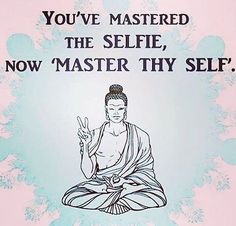
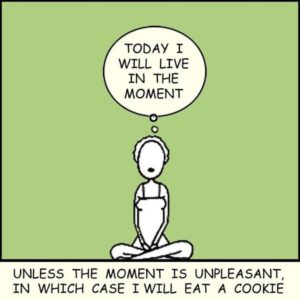
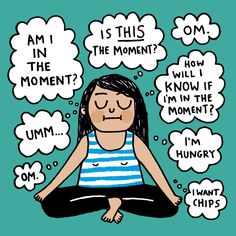
So how do I begin to become more mindful?
The answer is there are countless ways to improve our ability to become more present with ourselves and our surroundings. Meditation is typically the most commonly referred practice of mindfulness, but it is not all-inclusive, and many people struggle to commit to it. That being said, there is an unfathomable amount of ways to meditate and the solution is to try and figure out what works for you. Phone applications such as Headspace and free Youtube videos by Honest Guys are wonderful introductions and guides for how to practice meditation even if you have zero experience with the concept.
As a therapist, I practice meditations with my clients very often to help them to experience the benefits and struggles of attuning to ourselves. One of the most common difficulties is our mind tends to race whenever we try to singularly focus on our breathing and bodies, but that’s OK. The point of most is to become more self-aware and not judge ourselves. For example, we may have the thought “Oh crap! Did I leave my stove on today?” or “I really suck at this and everything” and if we can learn to accept this thought as just a thought, not judge this thought, and let it go then we can learn to apply this in other areas of our lives while also learning not to be so self-critical.
Meditation is a great way to help us to be mindful or, by definition, fully and consciously aware of ourselves, our thoughts, our body, and our surroundings, but it is not the only way. For example, if you have ever skied then you are, hopefully, practicing mindfulness the entire time. Skiing challenges us to be fully aware of our surrounding, to stay in tune with our bodies, our balance, focus on what lies ahead, and to adjust our position and mindset when we begin to become distracted.
There are plenty of other examples and ways to be more mindful as well such as:
- Mindful routine activities – Pay more attention to your sensations and feelings when you brush your teeth, clean your home, or take a shower.
- Practice focusing on breathing while you wait – Feeling anxious before an interview, speech, or test? Take some time to focus on your breathing inhaling through your nose and exhaling out your mouth while you wait. This is a very effective and easy technique to help reduce our anxiety physiologically.
- Mindful eating – Pay attention to your body and stop eating once you are full. Take one bite of your food at a time, fully experience that bite, and put down your fork between each bite.
- Morning mindfulness – Take five minutes out of your day to sit on your porch and watch the trees, cars, or whatever you see in front of you without glancing at your phone. If your mind wanders or worries then remember that it’s OK and just bring yourself back to the present moment of what is in front of you. Take a few minutes to sit down and enjoy your morning coffee.
Remember that mindfulness and meditation is a lot like working out or training for sport or a marathon – it is a muscle you have to actively build and train. It’s OK if you struggle for a while, because the fact is most people do in the beginning and may even struggle each day depending on what is going on in their lives. Mindfulness and meditation are both terrific practices that are supported by research to be helpful with issues such as attention issues, addiction, stress, anxiety, coping with chronic pain, and PTSD. However, it is important to remember it is not a cure-all, but simply a tool you can use to help you during tough times and solidify your growth during periods of your life where you feel confident.
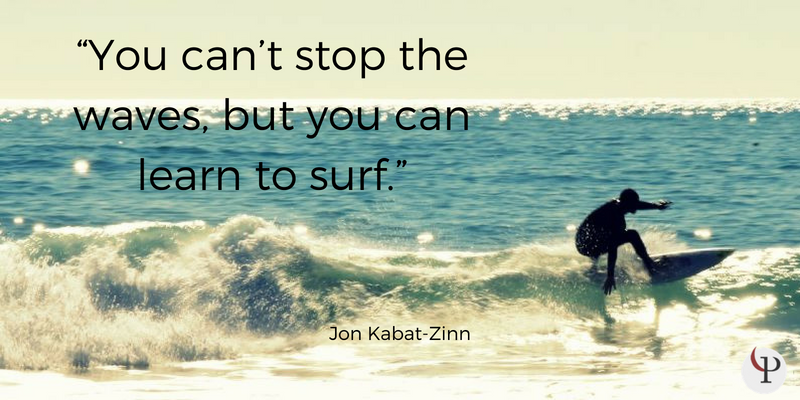
If you are ready to take the next step, learn more about how to be more mindful, and receive the support you deserve please click here to connect with one of our therapists in Grapevine or Dallas.
About the Author
Nick Overbeck is both a Licensed Professional Counselor and Licensed Chemical Dependency Counselor. Nick has nearly a decade of experience in mental health including college counseling, trauma informed treatment, career counseling, suicide prevention, crisis intervention, addiction treatment, promoting mental/emotional wellness in working professionals, and working with loved ones of those affected by addiction and/or mental illness.

